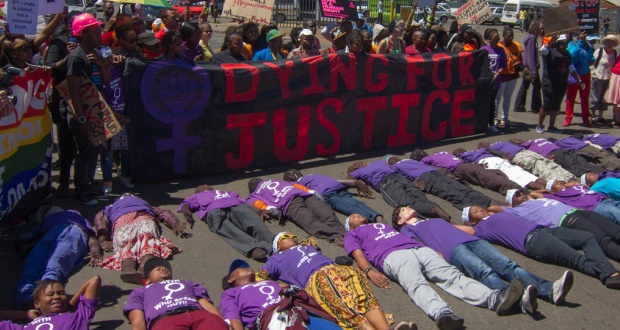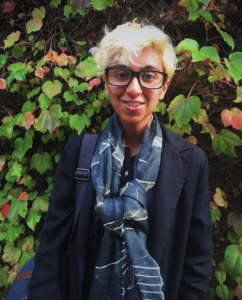The #RUReferenceList protests at the university currently known as Rhodes have ignited conversations around the way that rape culture at the institution is deeply entrenched, and female students continue to fear for their safety. But while there is no doubt that Rhodes has a rape problem, what about other South African university campuses? AAISHA DADI PATEL spoke to female students at the University of Cape Town and University of the Witwatersrand to find out whether they think that their institutions do enough to challenge rape culture on campus.

I’m not sure if rape culture has permeated to all levels at UCT – like in the lecture rooms, tuts, interaction with men on campus, at residences. I think where UCT has fallen short is recourse for women who’ve been victims of rape – so when incidents happen they don’t have much recourse. There is the Discrimination and Harassment Office (DISCHO) – but time and time again, it’s proven that it’s been inefficient at dealing with rape culture or related incidents. Often, people are just sent for training and that kind of thing, but women still see the culprit on campus regularly. Even if it escalates to the UCT tribunal, many culprits just get community service and women feel like no justice has been served.
Kerryn Gammie, 21, UCT
UCT is not doing enough to combat rape culture. Their DISCHO has come under fire several times, and while they’ve been reviewed, some of the findings were not made publicly available. The Student Wellness Centre, in addition, has been criticised for being unhelpful and cold towards survivors – this is unacceptable. The issue of private security being used against students and not for their protection has been a major conversation point, one which I echo. There have also been several stories of *womxn being sexually harassed by security by them catcalling/making inappropriate remarks.
The rapes at Rhodes Memorial have BEEN happening. I distinctly recall getting notifications about it in 2013. While UCT’s correspondence is sympathetic, it often comes across as them saying “please don’t get raped, guys”. It’s often about how *womxn are responsible for not being raped and less about men not raping.
Also, UCT’s staff can be incredibly awful when it comes to survivors, especially when they are diagnosed with a mental illness after their trauma. There are countless stories of academic staff being unsympathetic towards survivors who cannot complete their work/attend their classes or tuts. This again puts the burden on the survivor. UCT should be doing more to accommodate survivors.

Rape culture at UCT is rife, more especially in the residences. Male residences chant degrading songs all through O-Week and have pubs with names like the Puss and Pint. These practices have for many years been considered “tradition” but have recently come under much scrutiny following a series of events last November that saw the establishment of #PatriarchyMustFall. This year, Residence Council, a sub structure of the SRC, has been mandated to ensure that active steps towards a change in the narrative are taken. This process has started off well and is ongoing.
Institutionally, UCT’s response to sexual assault has been pitiful. There are too few structures that assist students who are raped or assaulted. It takes two weeks – if one is lucky – to book an appointment with a UCT psychologist. When a student is allowed an appointment , their psychologist is a white woman who is unable to holistically understand the pain and the trauma that the student of colour is experiencing. Furthermore, there are no channels that ensure that there is adequate justice for students who have been sexually assaulted. Perpetrators are given community service hours for rape and are allowed to be on campus and to continue with their studies. This is unacceptable and is extremely violent for rape victims. There has recently been a case of an art student who had sexually assaulted more than 40 students at the Art Campus (Hiddingh Campus). The student was given 80 hours of community service by the university tribunal. The student community is appalled. In a meeting between the SRC and the VC in February, the VC committed to investigating that specific case further and to investigate all similar tribunal cases and their respective outcomes – the SRC is yet to receive communication on the matter.
There has also been widespread uneasiness regarding the rapes that have happened at Rhodes memorial – which is a five-minute walk from campus. Despite the university having hired additional security, the rapist has not been found nor do students feel more secure. The university has come under much criticism for the private security and their purpose.
It is also unfortunate that it has taken three people being raped for the university to react accordingly.

I don’t think that Wits does enough. I think we have some really awesome people and spaces on campus that are challenging rape culture like the GEO (Gender Equity Office), the Silent Protest that we do every year, Prof Gqola and her work etc, but I don’t think that that necessarily translates into a lot of challenging of rape culture. Considering that we never hear much about cases being opened on campus (which worries me a lot), are we fostering space for victims of sexual assault on campus?
It’s apparently tradition that the men streak in front of the women. And because it was tradition it could not be questioned; we tried really hard to explain that it was about asserting masculinity and throwing consent out the window but they didn’t really want to accept the fact that they were forcing their nudity onto these girls. The whole idea of sexual objectification came up in the discussion and the men resorted to victim-blaming, saying that the women were objectifying themselves. It was so, so shocking. The fact that there are oppressively heteronormative and misogynistic traditions that have not been dismantled and are in fact enshrined? What the fuck is that?
I don’t think Wits does enough to challenge its institutional culture in many ways, even though it tries to create space for discussions to happen. Talking about something and doing something are two different things. Informally, I have a lot of support. But when I was harassed in the bathrooms there was absolutely no support from the university and nothing was done about what happened to me. Trans people don’t exist in policy. And that’s a big problem. There’s no space for us to choose alternative titles or gender markers, no policy to allow us to change our details to be in line with our identities. Only now are gender neutral bathrooms becoming a thing.There’s no policy for trans people applying to res either. We have to rely on the goodwill of others instead of having our safety protected by policy and by the institution.

Personally, I do think that Wits has taken steps in the right direction in terms of their policy on rape and sexual assault on campus, especially with the implementation of the Gender Equity Office. This was a great step taken by the university in light of the sexual harassment scandals in 2013. However, it seems as if the university did this to protect their public image more than to assist students. I say this because not enough has been done to make students aware of the Gender Equity (GE) Office, meaning that they are not then able to play their part in making sure that students are safe on campus.
In addition to that, I believe the GE Office is great in dealing with the after-effects of rape, but there are not enough preventative measures taken by the university to influence the mentality of students because there are too many men that feel entitled to our bodies.
I also feel that rape is difficult to deal with on campus because those that rape do so because they are in a place of power. Power given to them because of a position or power given to them by societal norms. This then gives them the advantage to make a mockery out of the issue or make it disappear. It takes a special kind of person to go against someone powerful, and as a result, most people shy away from speaking out. It also for this reason that as a woman I don’t feel safe on campus, or anywhere for that matter. In every space that I exist in, my body WILL always be sexualised.
Policy is not enough to change this. People need to change their ways of thinking and then maybe change will come about. But this will only come about through action. All students in all tertiary institutions should take a united stance against the existing rape culture. Through this movement we will educate each other more on the matter and hopefully even influence how rape is dealt with a national level, which is highly problematic at the moment.

Wits is definitely not doing as much as they can to challenge rape culture. We see this in many aspects of the university, whether it’s the way in which the march for free pads was dealt with, or the treatment of rape survivors. I think it’s important to look at rape culture in the greater context of women’s issues. So in terms of rape culture, I don’t think the university has even begun to address the reality we face in this university. As management, especially in light of the situation at Rhodes, anti-rape activism should be of the utmost importance to both the policy makers, as well as the individuals in management positions. It is almost left up to us as the students to address these issues.
Support from the university is so difficult to find for rape survivors, I have a personal friend who has approached various parts of the institution for help with sexual assault and it was a very bureaucratic process. In terms of women’s issues, the university does not take these protests seriously at all. For example, I was very involved in the protest for free pads and the way it was received by the university was shocking. I found it very ridiculous that Habib himself did not feel it was important enough to attend. The university has shown support for the cause, but we have yet to see any concrete policy in place that helps us move forward. Even the students themselves were not in complete support, one student even referred to it as a “tea party” and a self-proclaimed “feminist” has publicly come out against the cause. So I think the university can do much more to inform both men and women on campus on rape culture, as well as hold workshops and discussions to directly address this issue.
But as we’ve seen with #FeesMustFall and other student struggles, we as students must take it into our own hands. And thus, the way in which we live and study needs to be in itself a form of defiance and dismantling patriarchy is something we as female students have to lead for ourselves.
*Womxn is the alternate spelling of the word woman or women, adopted by intersectional feminists who assert that the alternate “womyn” spelling is too narrow a term, excluding trans* womxn, womxn of colour and other womxn identifying with feminist movements. The “x” also identifies womxn as autonomous beings from men, not offshoots of them.
Voxes have been edited for brevity and clarity










